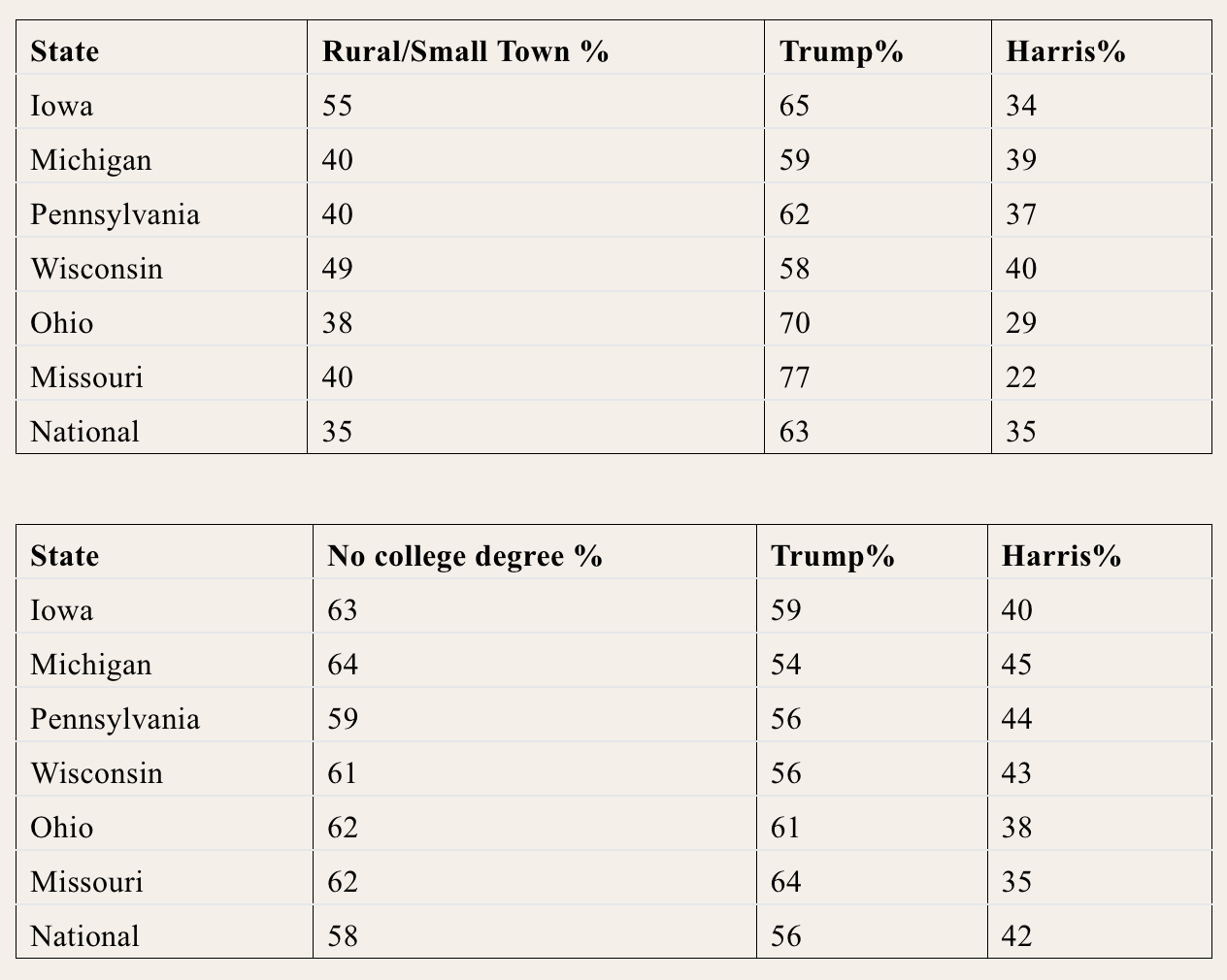📖 “The Emerging Democratic Minority,” by John B. Judis. TLP contributor and good friend John Judis lays out the cold political facts facing Democrats in his new piece for Compact. Donald Trump’s electoral victories in 2016 and 2024 laid bare serious problems with the party’s image and geographic concentration:
In 2016, Clinton lost six states that Obama had won twice: Pennsylvania, Michigan, Wisconsin, Iowa, Ohio, and Florida. The first three of these states were part of a “blue wall” that Democrats had won in every presidential election since 1992. Biden put these three states back in the Democratic column in 2020, but Harris lost them and the other three in 2024. And she lost Iowa, Ohio, and Florida in margins that suggested these states have now become part of a Republican “red wall.” Harris’s defeat in these states can’t simply be attributed to her being a weak candidate. Popular three-term incumbent Democratic Senators lost in Ohio and Pennsylvania, and two-term incumbent Tammy Baldwin barely squeaked by in Wisconsin.
If you look at the states that Democrats lost in 2016 and 2024, and if you include states like Missouri and Montana that were once swing states, you come up with two features that could show a trend to the Republicans. These states have a higher than the national average percentage of rural and small-town voters, and of voters without a college degree.
You would also find above-average percentages of rural and small-town voters and of voters without college degrees in solidly Republican states like Mississippi, Kentucky, West Virginia, Wyoming, and North Dakota. The exceptions are the upper New England states that were once dominated by liberal or moderate Republicans and became amenable to Democrats decades ago when the Republican party was captured by conservatives.
If you put the states that shifted to the Republicans in 2016 together with the more traditionally Republican states, you have the makings of a Republican advantage in presidential elections and a persistent Republican majority in the Senate. If you look at the electoral map for 2028, and measure those states that are safe or likely—the requirement for “likely” being that the party in question won them in 2024 by more than five percentage points—you come up with 218 safe or likely Republican electoral votes and 192 Democratic ones. The red wall is now larger than the blue wall.
Judis also has an excellent new reflection on David Shor’s 2024 data on his own Substack, and for extra credit check out Shor’s original presentation here. Read these and you too can be a pundit. Amaze your friends, and bonus: your analysis will be correct!
📰 "The beginning of the end of the Trump era," by Shadi Hamid. For a critical look at the other side of the partisan divide check out Hamid’s recent column in The Washington Post. He argues that Trump has squandered a golden opportunity to cement Republicans' gains from 2024 by instead choosing to pick unnecessary partisan fights that will turn off many voters—and that Democrats may be poised to capitalize on if they are smart:
Had Trump shown even a modicum of magnanimity in victory—had he focused on targeted policy wins that could demonstrate competence—he might have cemented a Republican majority for the foreseeable future. The ingredients were there: a working-class coalition spanning racial divides, a skepticism of elite institutions and a hunger for economic nationalism. But it was, and is, not to be. In some ways, then, Trump’s hyperpartisan attacks on the status quo, while terrible for the country in the short term, are a boon for Democrats and progressives in the long term.
However, he notes, the party must reclaim the mantle of "unabashed patriotism." What would this look like? It would mean "embracing American symbols and traditions without irony or qualification. It would mean celebrating institutions such as an independent judiciary, free speech and unfettered debate as uniquely American strengths rather than obstacles to progressive goals."
He adds:
Rebranding as the patriotic working-class party won’t be easy, and I’m not sure the Democratic Party—dominated as it is by hyper-educated liberal elites—is capable of sounding convincing on these issues. But if Democrats can’t rise to the occasion, then perhaps they deserve to languish in a political wilderness of their making.
📚 Moscow, 1937, by Karl Schlögel. 1937 was a hell of a year in the Soviet Union. This is the best book to read to begin to grasp its mind-boggling nature. Truly a masterpiece. (Read this in conjunction with Yuri Slezkine's, The House of Government: A Saga of the Russian Revolution.)
In this compelling book, the renowned historian Karl Schlögel reconstructs with meticulous care the process through which, month by month, the terrorism of the Soviet regime in the late 1930s spiraled into the ‘Great Terror’ during which one and a half million human beings lost their lives within a single year. He shows how, in the shadow of the reign of terror, the regime around Stalin also aimed to construct a new society. Based on countless documents, Schlögel’s historical masterpiece vividly presents an age in which the boundaries separating the dream and the terror dissolve, and enables us to experience the fear that was felt by people subjected to totalitarian rule. This rich and absorbing account of the Soviet purges will be essential reading for all students of Russia and for any readers interested in one of the most dramatic and disturbing events of modern history.
⚾️ MLB Opening Weekend. Baseball is back and just in time to divert our attention from politics! Although Major League Baseball is increasingly an imbalanced economic mess with a few super wealthy franchises like the Dodgers, Mets, and Yankees spending four to five times as much on players as other mid-market teams, hope springs eternal for everyone at the start of the season. TLP will be cheering on the Orioles, Nationals, and Royals over the next six months and we look forward to seeing you and your favorite team at the ballpark.
🎸 Radio DDR, by Sharp Pins. To accompany opening weekend libations, check out this excellent new indie rock record from a tight young trio out of Chicago. Shimmering guitar hooks and warm vocals that evoke older bands like The Byrds and Big Star plus more recent ones like The Apples in Stereo and Guided By Voices. Sharp Pins are currently on tour with The Hard Quartet (Stephen Malkmus, Emmett Kelly, Matt Sweeney, and Jim White), and we highly recommend their live set after seeing them recently at the 9:30 Club. Here’s the opening track from the record, “Every Time I Hear.” Play ball and enjoy some new music this weekend!









"He argues that Trump has squandered a golden opportunity to cement Republicans' gains from 2024 by instead choosing to pick unnecessary partisan fights that will turn off many voters—and that Democrats may be poised to capitalize on if they are smart."
Two problems here:
Trump is not a Republican, he previously pondered a presidential run -as a Democrat. In his politics, Trump is more akin to a parasite, which secretes hormones which alter its host's behavior to suit its purpose. Trump could have decided to infect the Democrats but, as this article states, there are so many highly (over?) educated Democrats that such a strategy would be unlikely to work. Trump's predatory style relies on ignorance and anger in its targets.
Had he been in a position to run forty years ago, the Democrats, filled with opposition to Reagan and his internationalism, and representing workers laid off as a result of the meltdown in US manufacturing triggered by oil price spikes, would have made a much better target.
Two: The Democrats need to decide which parts of their platform to jettison in order to succeed, and, having done so, what will be left of their party. I believe that they are in the right on many parts of their platform, but the voters don't want them to be.
To be truly effective at reducing carbon emissions, any "green" agenda will have to explicitly state that living standards will have to decline. Fewer, smaller cars. Much denser housing. Food rationing, less meat, etc. The Democrats haven't stated this, but the Republicans are not entirely off the mark when they accuse the Democrats of wanting to do this. There's no way to achieve carbon neutrality otherwise.
Abandon the fight for trans rights. It took two generations to get from the Stonewall Riots to the Obergefell decision. And a premature drive for full equality early in the Clinton administration triggered a backlash that set the movement back 20 years. We are now only about 10 years into the trans rights movement. As with gay rights, true progress and understanding won't happen until most families have or know an openly trans person.
If the Republicans are the party of angry old men, the Democrats need to steer away from being the party of angry young women. For every two college educated women frustrated by the patriarchy, there is one woman who feels that they are the reason that her husband/brother/son can't get a decent job or might lose his at any moment because of a foolish remark or some office politics. The same goes for race, gender, etc ... The Democrats may be right to champion oppeessed groups, but it is easy for others to see this as the creation of protected species, which fuels the very resentment that DEI policies were supposed to counter.
I could go on. But my point here is that the Republicans are very vulnerable on the basis of their incompetence and venality but, to exploit these weaknesses will likely require the Democrats to abandon, partially or entirely, some major pillars of their platform.
The American people don't want to buy what they have been selling.
Really, it is not one country. Pretending that it is means the best case is the constant flipping of control by narrow margins that you have decried elsewhere. Worst case is a lot worse.